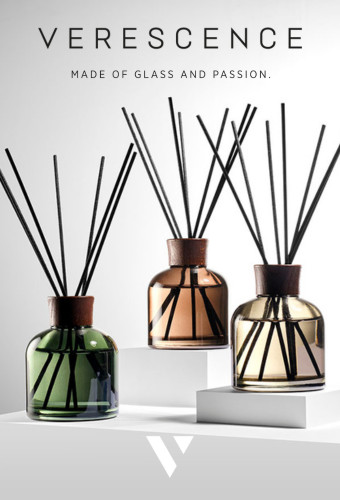The success encountered by several alternative fragrance brands has triggered many a vocation. Makers of fragrant compositions and bottle makers have all witnessed the same phenomenon: an increase in demands from brand founders. And it is not always possible to follow up on these demands, notably when the development time is too significant compared to the quantities envisioned, or when the cost of industrial production is too steep.
About 40 different professions
From the founder’s point of view, it’s the number of people involved and the steps required for development that can be disturbing: creating the fragrance, making the bottle, decoration, choosing a pump and a cap, sourcing possible accessories, designing and printing a box, etc. All total, about 40 different professions come into the creative process. So, for those who want to do something simple and quickly, recourse to a turnkey specialist is necessary. Companies like Perfarium, Flair or Boss’M offer full-service creation, bringing together the skills of their network.
Depending on their desires - and budget - clients can call on an independent perfumer/ creator, or look through the catalog of a major house. It’s a sensitive point, considering the importance of fragrance in consumer purchasing decisions, above all in the case of brands betting on difference.
Most often, major fragrance composition houses do not invoice the expenses for creating. But, as their profitability rests on sales of the jus, they are dependent on quantities. Materially, it’s not possible for them to increase projects for small, emerging brands. To reduce development delays, the solution consists in offering compositions from their catalogue that correspond to the brand’s brief, with a few adaptations at times. The independent perfumer’s project will, on the contrary, be that of a customized development that resembles the brand’s DNA as closely as possible. But it involves the costs of creation.
Standard or specific
As for the bottle, founders of small alternative brands will come up against a similar dilemma: choosing between customized and standard. Again, the question cannot be neglected since packaging is the first point of contact between consumer and product.
The making of special bottles, because of the costs involved (design, the making of moulds, minimum production amounts), is most often unaffordable for a small brand.
The first solution offered by suppliers consists in personalizing a standard bottle. “We suggest they enhance our standard bottles, and these are strong, interesting technical challenges,” explains Isaure de la Noue, general manager of Metapack, French supplier specialized in bottle design, production and decoration. Considering the relatively small quantities and the complexity of operations sometimes required for products seeking to be exceptional, sometimes part of the work must be done by hand. CCI Productions, which offers different production and packaging services, has at its location in Acquigny in Normandy, manual lines and an “haute couture” workshop intended for small series and the most sophisticated products. La Factory, another specialist of "bespoke" packaging (glass, cap, packaging, filling,...), has sites in France and Romania.
Finally, in terms of packaging, options for personalization are such that the recourse to a standard bottle should not be perceived as something to slow creativity. The real obstacle is rather financial: aside from flagrant cases of fakes, this is what generates resemblances that are damaging to brand identity, from the fact of under-investing in the perfecting process.
Intermediary solutions between standard and special products, between “made in France” and sourcing in other countries, are also available. A few glassmakers offer semi-automatic production. One example is Verreries Brosse. “The mastery of semi-automatic processes enables us to make series of only 2,000 to 3,000 pieces, while automatic processes require 10 times more volume,” explains François Chéru, sales director.
In addition, companies such as Flacon Couture are specialized in developing special bottles in small series, intended for the niche fragrance segment. “The difficulty lies in reconciling emerging brands’ very high demands for quality with small series, while remaining within the realistic budgets,” says Xavier Vaisière, company president.
If glass is popular and makes up most of the market, one should not forget that interesting solutions are also offered by other materials: plastic polymers, like Surlyn from DuPont, wood, with remarkable bottle examples created by Spanish companies Technotraf or Pujolasos, and also stainless steel, largely used for concentrates but which hasn’t greatly pierced the market due to high costs.
When the budget is not a problem, remarkable solutions are available, as those offered by Marcel Franck. Only set up again recently, the company offers luxury sprays inspired by those the brand was known for in the early 20th-century; and it also offers a collection of glass bottles in very limited series. “These are very high-end bottles, made of blown glass by master glassmakers,” explains Bernard Dennery, president of the company. These are the extremes of craftsmanship.



































